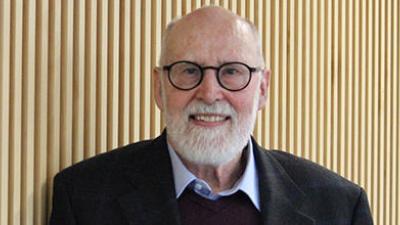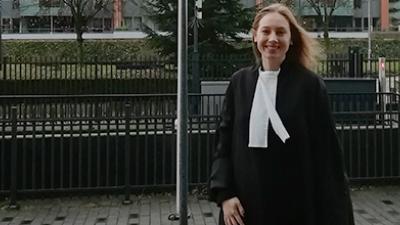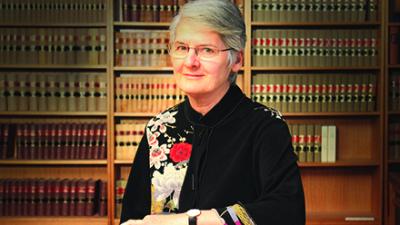
Degree
Master of Laws
Years at ANU
2020 to 2021
What does it mean to you to be a Yuill Scholar and ICJ Judicial Fellow?
To spend a year working with a judge of the International Court of Justice is, quite simply, the stuff of dreams for any international lawyer. As the principal judicial organ of the United Nations, the court resolves some of the most complex and important inter-state disputes.
The chance to observe the peaceful resolution of those disputes from the inside is a precious one – especially during a particularly busy period for the court and at a time when international law is facing its fair share of challenges. Three months into my fellowship, it remains surreal to walk through the gates of the Peace Palace each morning. I hope that feeling never wears off.
I am especially proud to be the ANU Yuill scholar. Since arriving in The Hague colleagues have consistently asked, “what is it about Australian international lawyers, they seem to punch above their weight, is there something in the water?”
Peculiarly, despite being on the other side of the world, I have had more cause than ever to reflect on what it means to be 'an Australian international lawyer'. Antipodean accents aside, my working thesis is that we are defined by a unique commitment to connecting and celebrating fellow Aussies in the field. I am proud to be part of that community and nowhere is it stronger (or whatever is in the water more potent) than at the ANU. I am indebted to ANU and the Yuill endowment for making this pipe dream possible.
What sparked your interest in international law and how did your ANU studies foster your passion in this field?
I started university vaguely interested in a career in foreign policy and figured law might serve a good foundation. After struggling through the first few years of property and trusts, I applied for the Jessup Moot, discovered international law and never looked back. I was drawn to the field on a principled level – the pursuit of a more just world where disputes are solved through law not war. But I also found that in practice it combined my love of public law, history and politics.
For me international law is doctrinally rigorous yet affords (or demands) creative problem solving, all while balancing political realities with lofty ideals. As Dame Rosalyn Higgins (the Court’s first female president) wrote, it presents, “an endless kaleidoscope of problems”, which to try and solve, “is a great and exciting adventure”.
When COVID-19 thwarted plans to work abroad, I decided to make the most of my time on home soil and enrol in the ANU Master of Laws (LLM). Even over Zoom, I benefitted immensely from the expertise of my professors, many of whom – such as the wonderful Associate Professor Esmé Shirlow – continue to be generous mentors.
Studying at ANU presented unrivalled opportunities to engage with government lawyers and it was Professor Richard Rowe PSM and Stephen Bouwhuis’ International Law and Australian Government course, which confirmed a sneaking suspicion that I might enjoy government legal advising. The way the ANU LLM integrates deep doctrinal and theoretical thinking with practical skills (for example, Richard and Stephen had us negotiate a maritime boundary treaty) set me up well for practice and has had a marked influence on the international lawyer I now am. So, I have a lot to thank COVID for!
What do you hope to achieve – personally and professionally – through your fellowship at the ICJ?
It is an unparalleled opportunity to deepen my substantive knowledge of international law and ICJ practice and procedure. After years of participating in and coaching Jessup Moot teams, I am especially excited by the chance to closely observe both the oral and written advocacy of counsel appearing before the court. However, the most rewarding aspect by far is the chance to broaden my international law horizons in an environment where the court’s 15 judges and their teams come from diverse backgrounds.
The chance to work with a judge with a civil law background is especially rewarding. I find myself constantly challenging my assumptions, better justifying my reasoning and having far more passionate debates about whether something is a general principle of international law than I would in a room full of Australian lawyers.
On a personal level, sharing this experience with 15 other judicial fellows from every corner of the globe is a real highlight. I suspect that in addition to lifelong friendships (and – fingers crossed – places to stay in New York, Turkey, South Africa, Brazil, etc.) our paths will continue to cross as colleagues in the small world of international law, even if on opposing ends of a bar table.
It is also exciting to be based in The Hague where there is never a shortage of international law events and opportunities to meet like-minded lawyers from other courts, tribunals, organisations, and embassies. Of course, I am making the most of the novelty of being able to visit a friend in Paris or London for a weekend too!
What are your long-term career goals?
After finishing at the court, I am excited to return to Canberra and continue my role as a Senior Legal Officer in the Office of International Law within the Attorney-General’s Department. It is a great privilege to be a government international law adviser and I am looking forward to using what I learn at the court to better advise the Australian government on its rights and obligations.
Longer term I hope to complete a PhD and continue carving a career that enables me to contribute to the field as both a practitioner and academic. Beyond that, careers in international law are far from linear, so I won't hypothesise too much and will simply have to see where the adventure leads!
Learn more about our Yuill Scholarship to Support the International Court of Justice Fellows Programme here.


